Diary/notebook of Herbert Stanley Geldard - Part 3
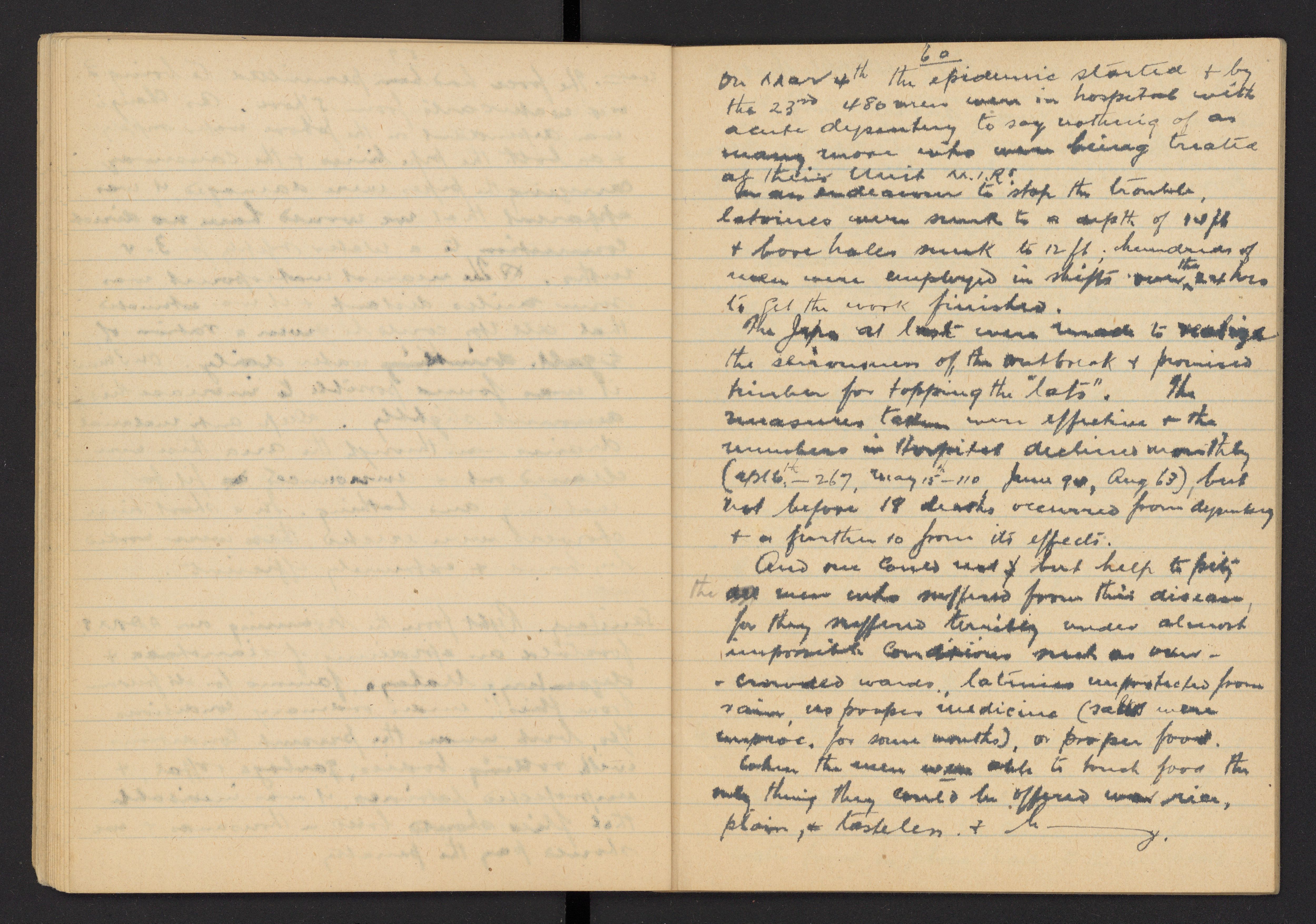
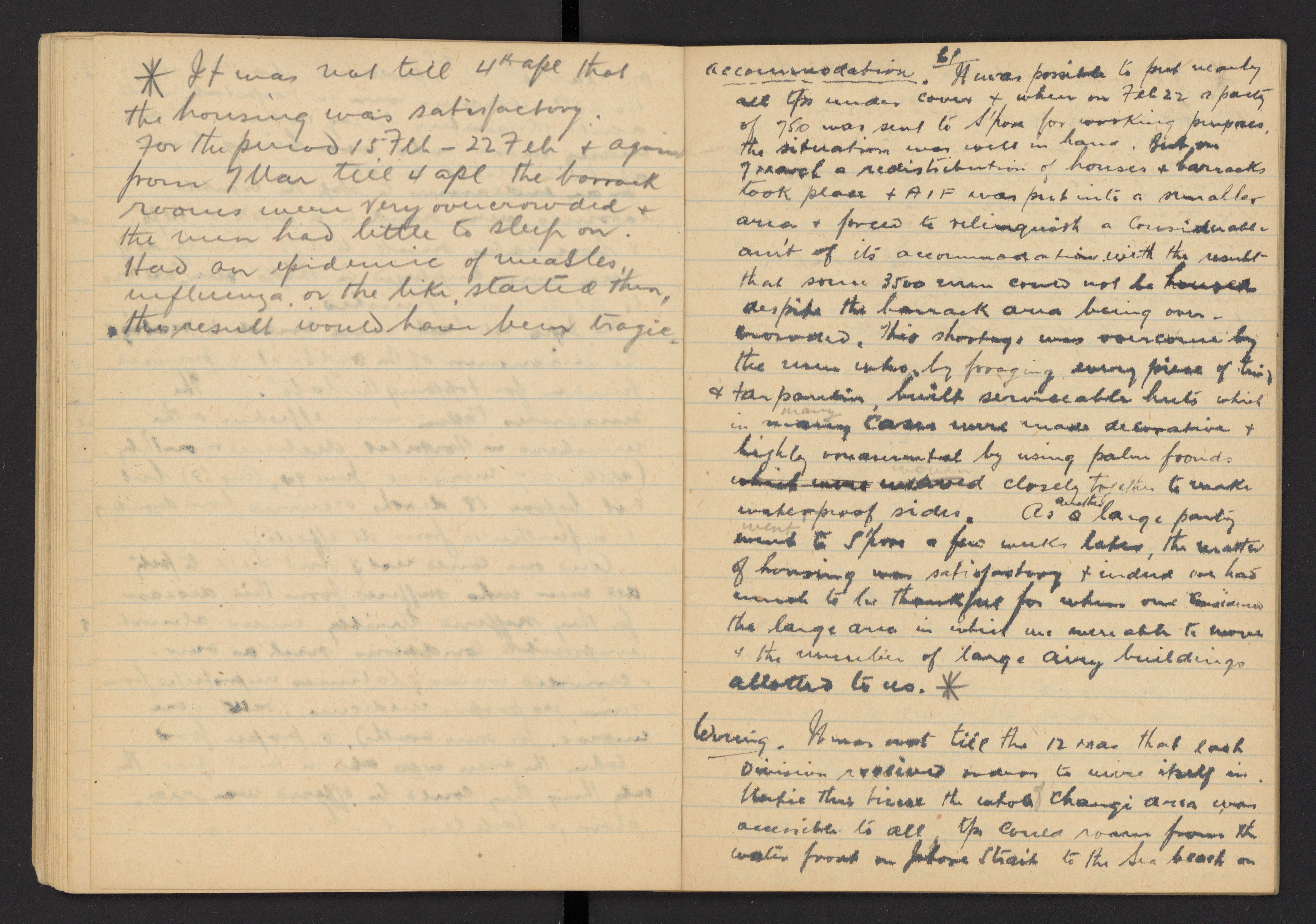
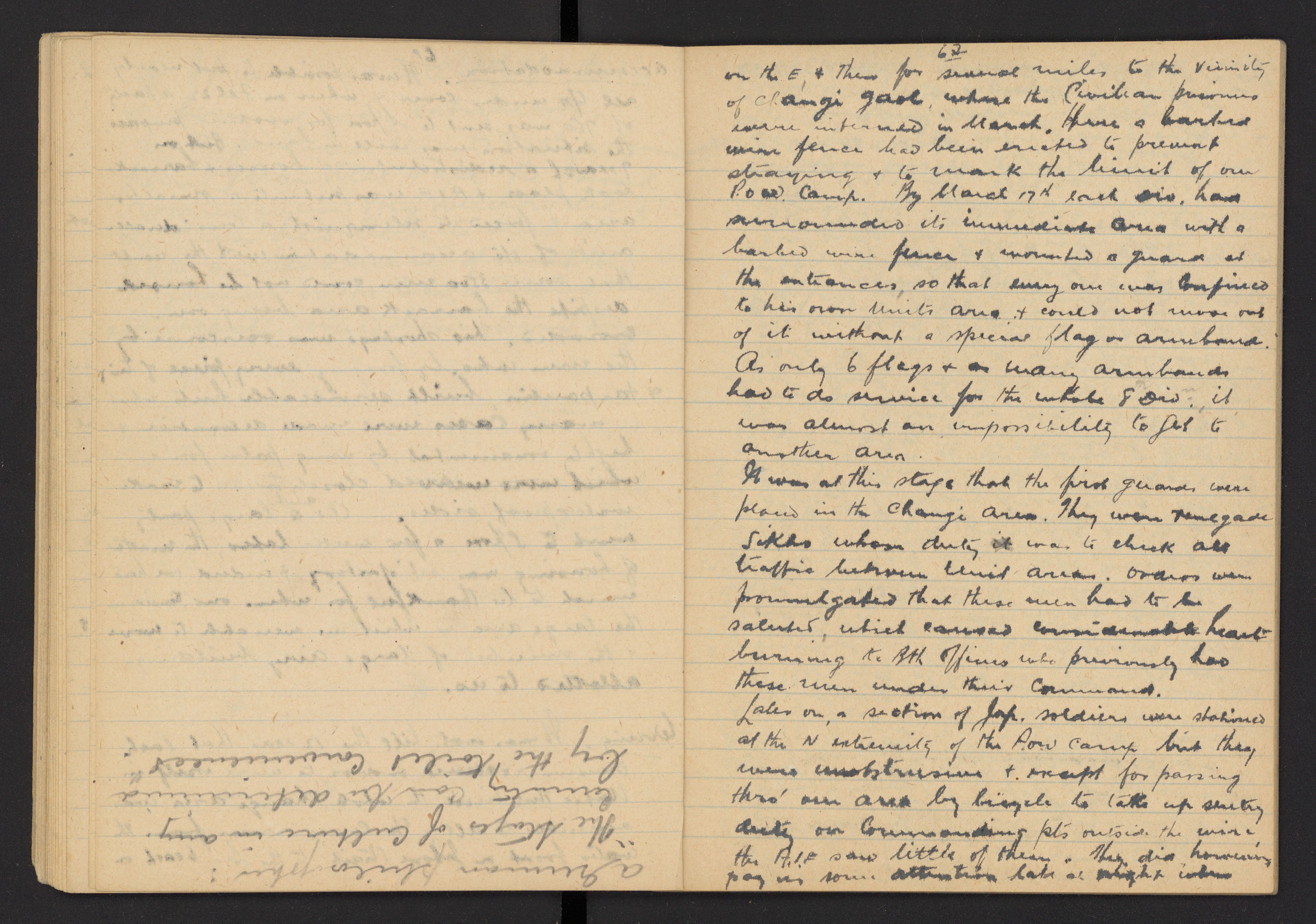
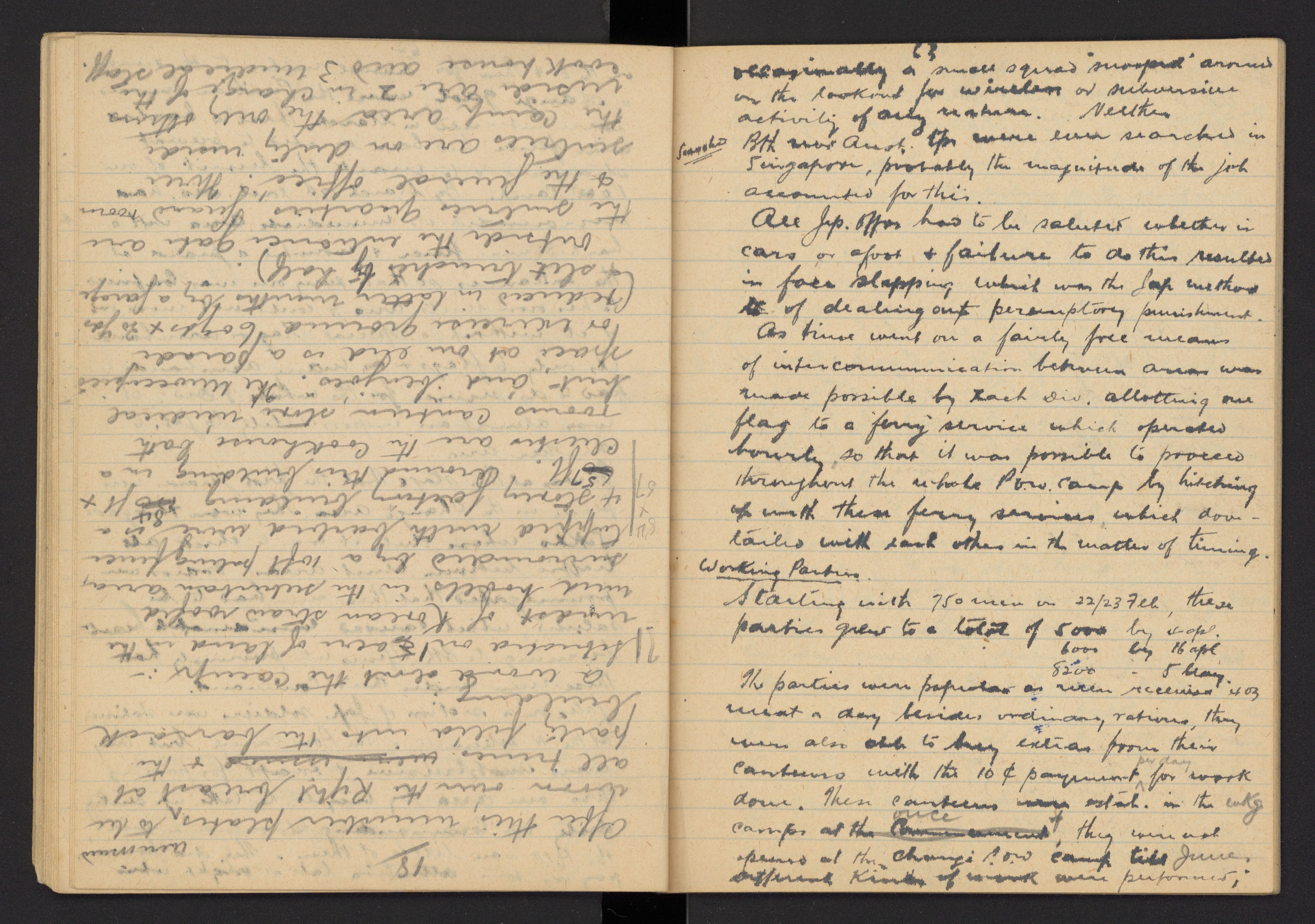
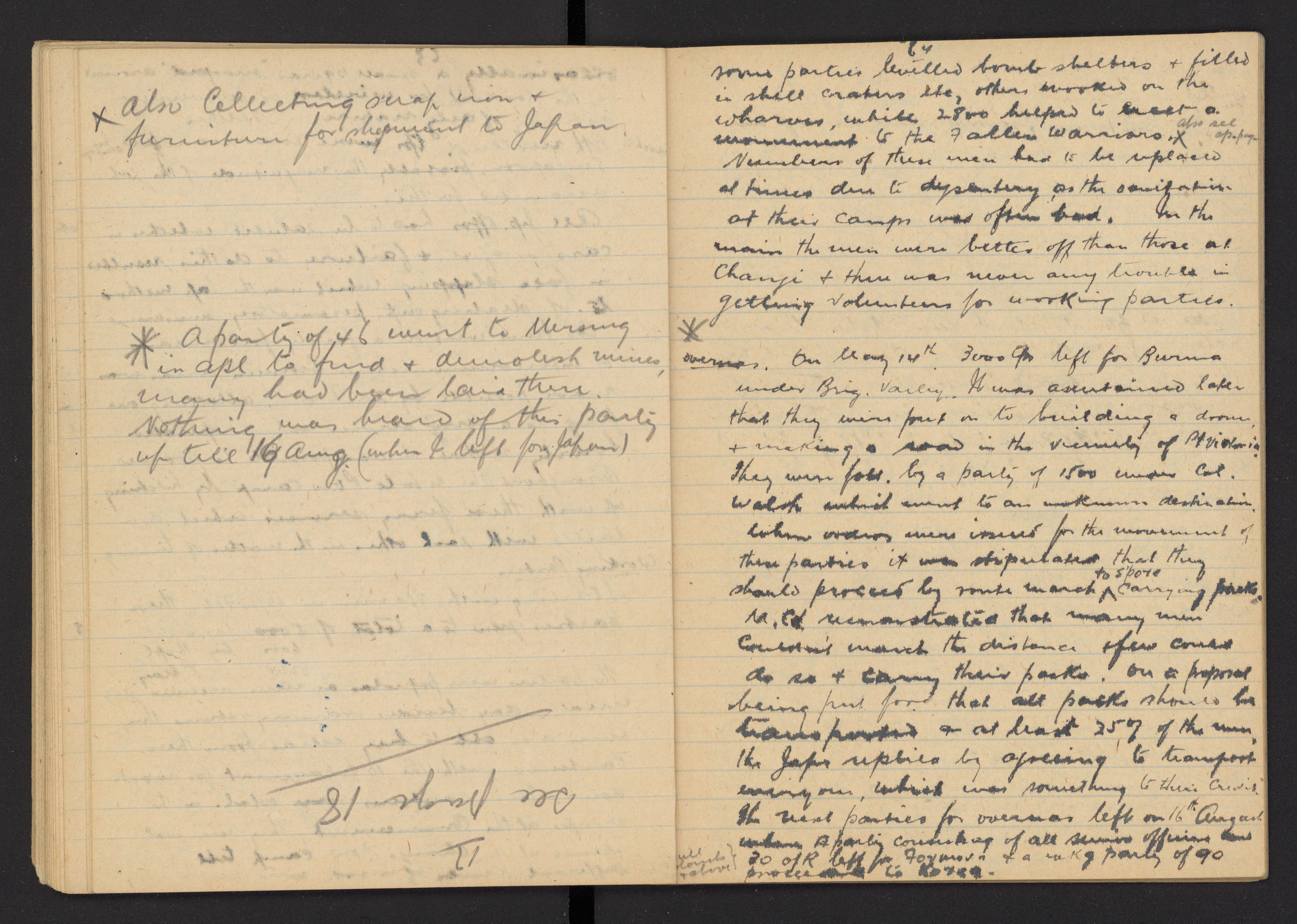
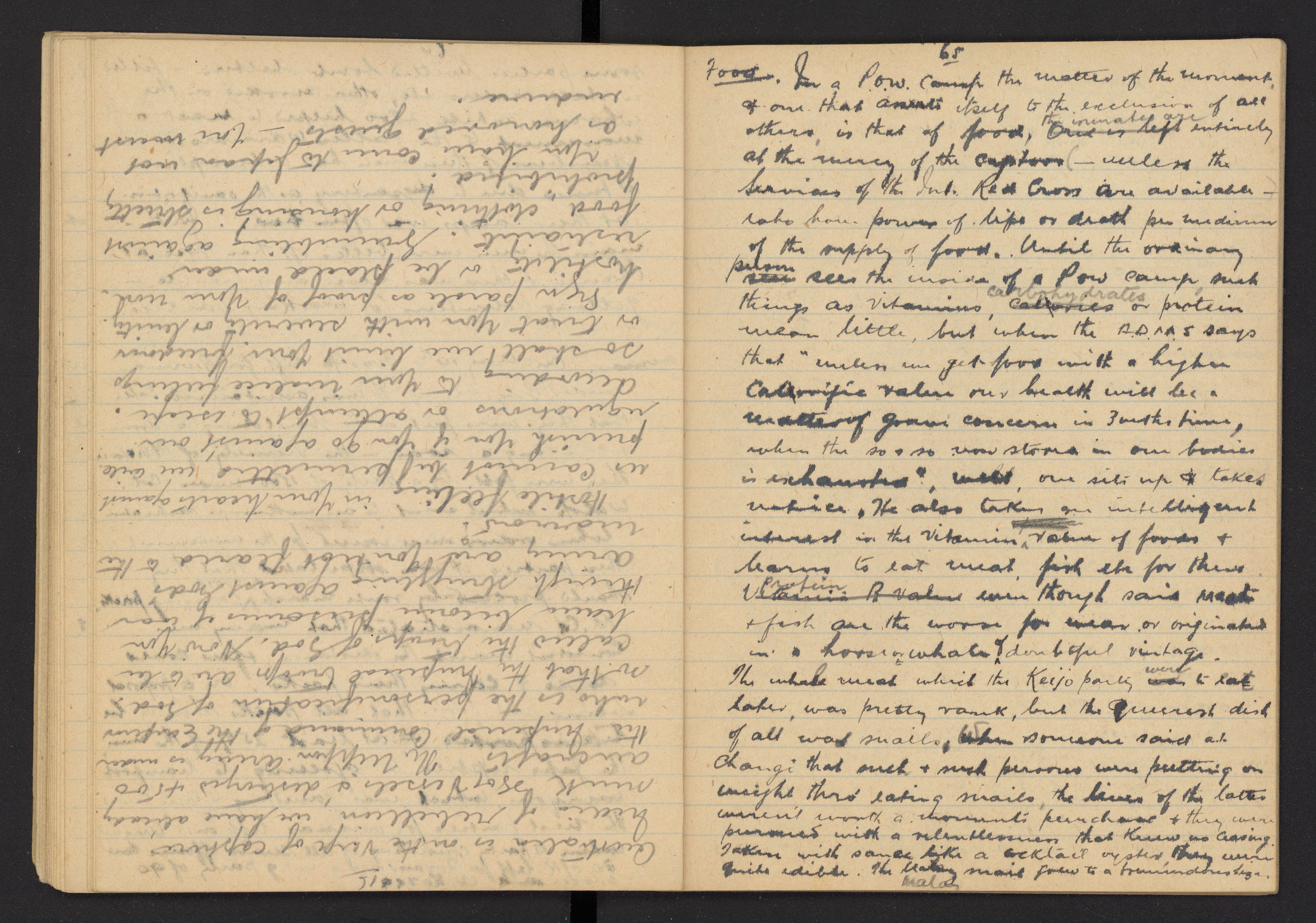
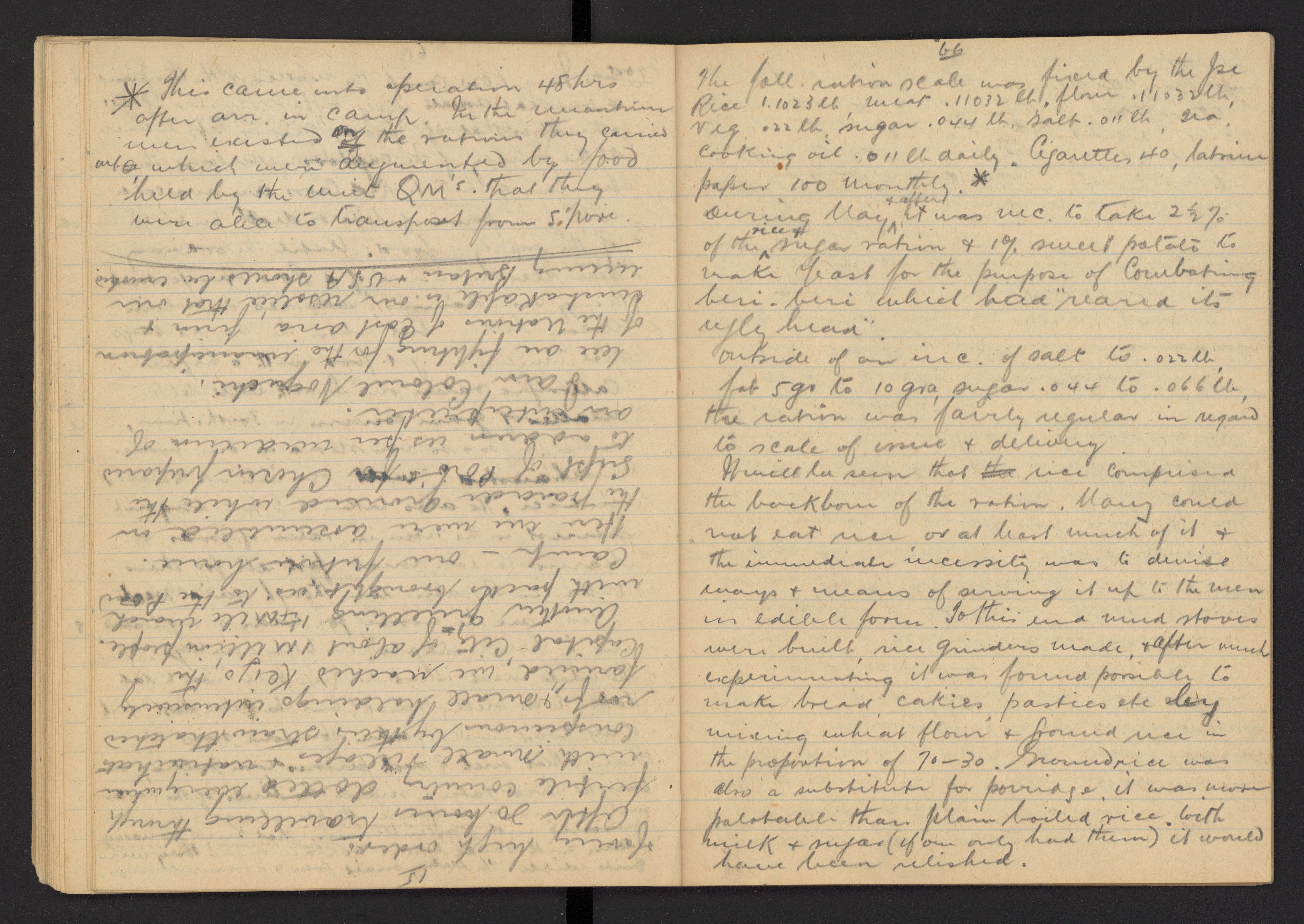
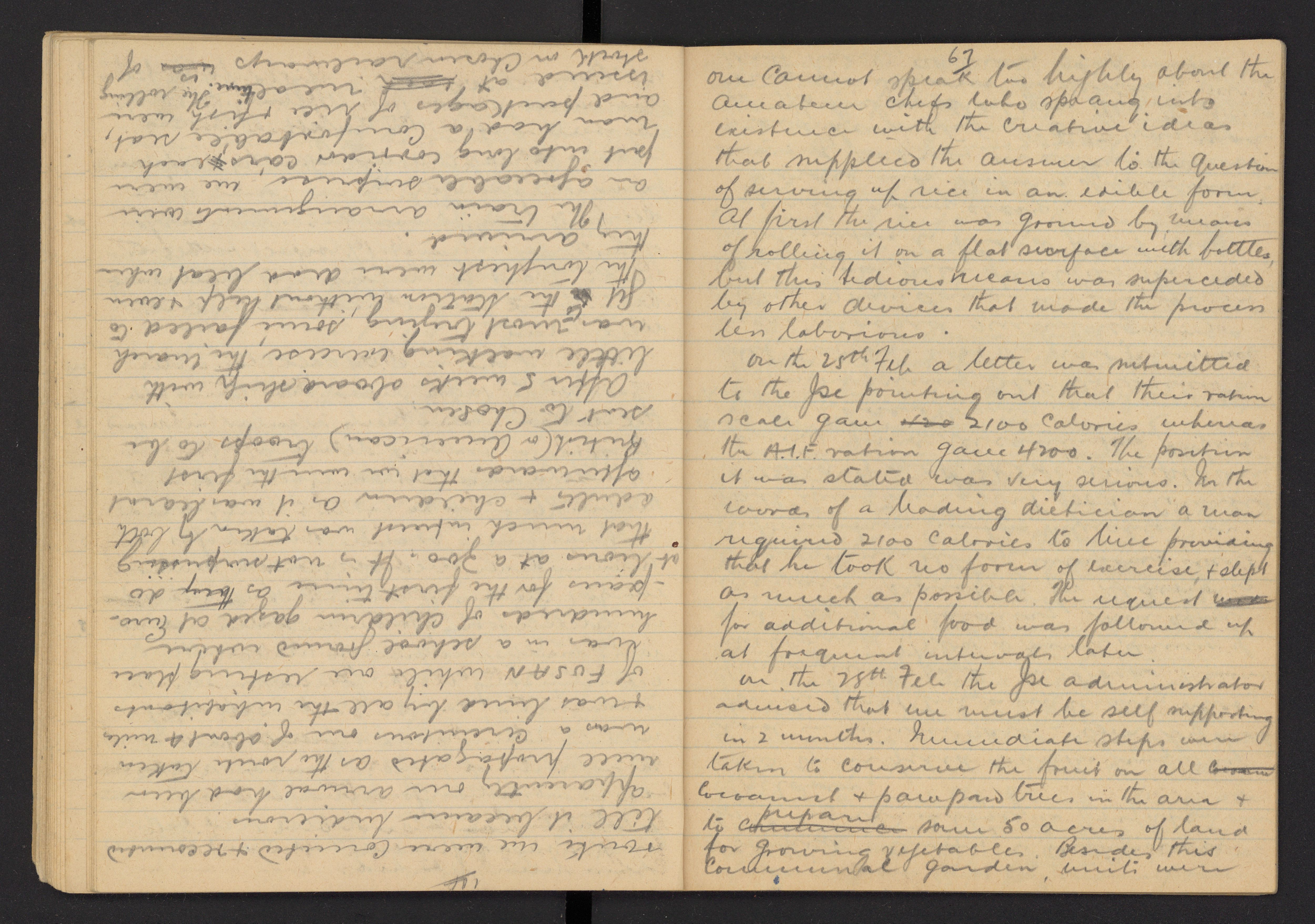
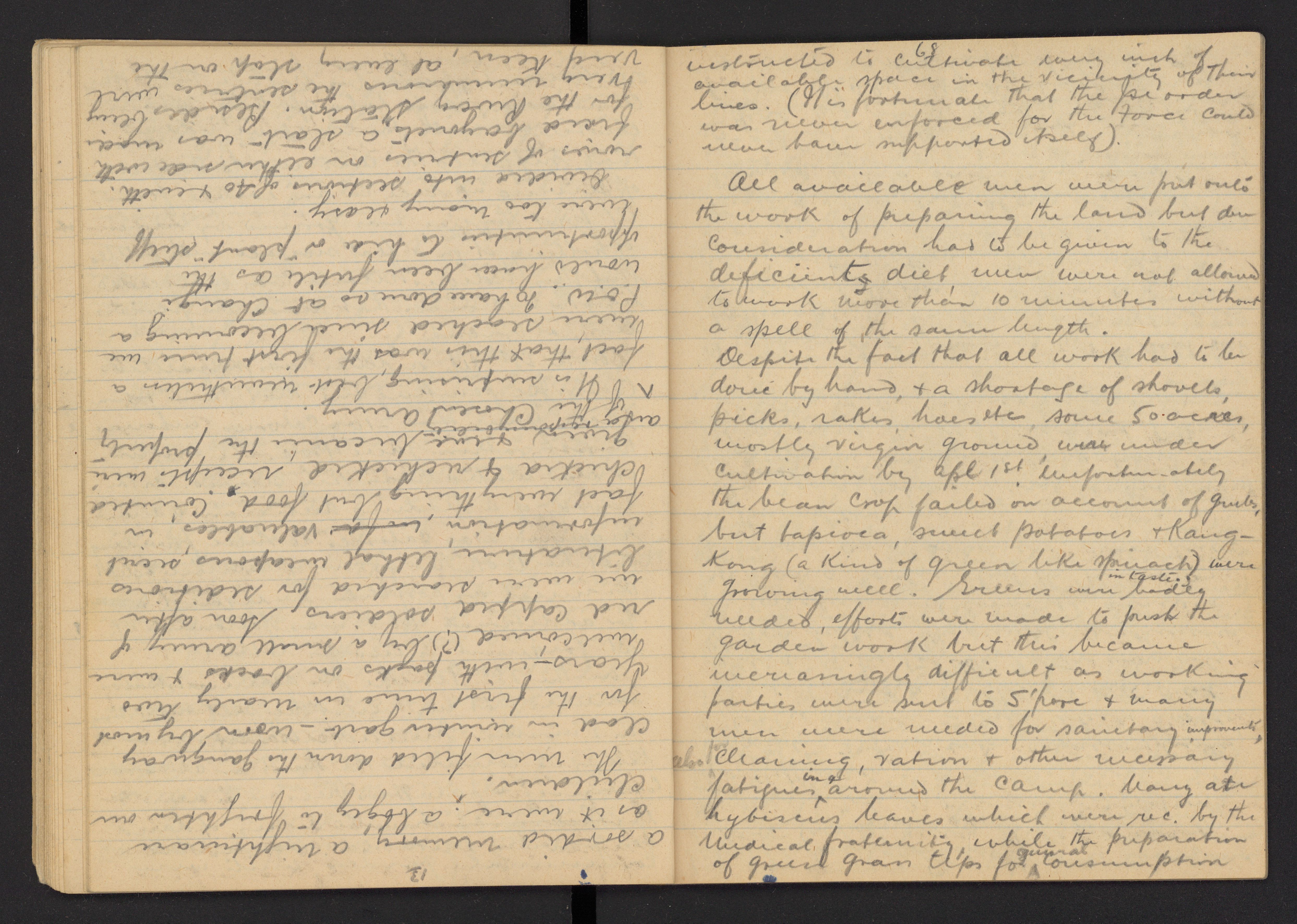
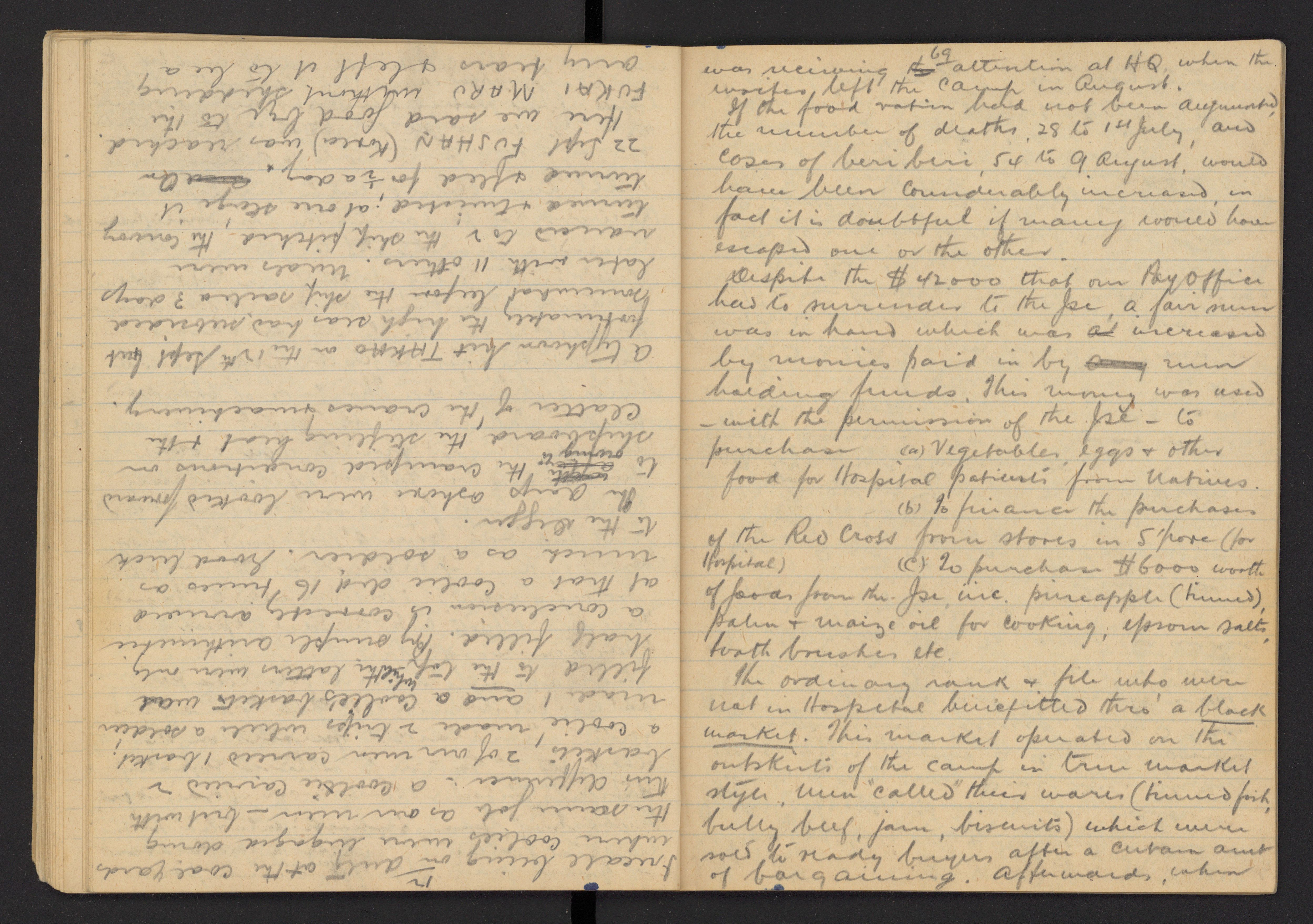
60
on Mar 4th the epidemic started & by
the 23rd 480 men in hospital with
acute dysentery to say nothing of as
many more who were being treated
at their unit M.I.Rs.
In an endeavour to stop the trouble,
latrines were sunk to a depth of 14 ft
& bore holes sunk to 12 ft; hundreds of
men were employed in shifts over ^the 24 hrs
to get the work finished.
The Japs at last were made to realize
the seriousness of the outbreak & promised
timber for topping the "lats". The
measures taken were effective & the
numbers in Hospital declined monthly
(Apl 6th - 267, May 15th - 110, June 94, Aug 63), but
not before 18 deaths occurred from dysentery
& a further 10 from from its effects.
And one could not x but help to pity
the all men who suffered from this disease,
for they suffered terribly under almost
impossible conditions such as over-crowded
wards, latrines unprotected from
rain, no proper medicine (salts were
unproc. for some months), or proper food.
When the men were able to touch food the
only thing they could be offered was rice,
plain, & tasteless. & b_______y.
*It was not till 4th apl that
the housing was satisfactory.
For the period 15 Feb - 22 Feb & again
from 7 Mar till 4 apl the barrack
rooms were very overcrowded &
the men had little to sleep on.
Had an epidemic of measles,
influenza, or the like, started then,
the result would have been tragic.
61
Accommodation. It was possible to put nearly
all tps under cover & when on Feb 22 a party
of 750 was sent to S'pore for working purposes,
the situation was well in hand. But on
7 March a redistribution of houses & barracks
took place & AIF was put into a smaller
area & forced to relinquish a considerable
am't of its accommodation with the result
that some 3500 men could not be housed
despite the barrack area being over-crowded.
This shortage was overcome by
the men who, by foraging every piece of tin,
& tarpaulin, built serviceable huts which
in many cases were made decorative &
highly ornamental by using palm frondswhich were weaved woven closely together to make
waterproof sides. As a another large party
went to S'pore a few weeks later, the matter
of housing was satisfactory & indeed one has
much to be thankful for when one considered
the large area in which we were able to move
& the number of large & airy buildings
allotted to us. *
Wiring. It was not till 12 Mar that each
Division received orders to wire itself in.
Until this time the whole of Changi area was
accessible to all, tps could roam from the
water front on Johore Strait to the Sea beach on
A German philosopher:
The Stages of Culture in any
Country can be determined
by the toilet Conveniences.
62
on the E, & then for several miles to the vicinity
of changi gaol, where the Civilian prisoners
were interned in March. Here a barbed
wire fence had been erected to prevent
straying & to mark the limit of our
P.OW. Camp. By March 17th each Div. had
surrounded its immediate area with a
barbed wire fence & mounted a guard at
the entrances, so that every one was confined
to his own Units area & could not move out
of it without a special flag or armband.
As only 6 flags & as many armbands
had to do service for the whole 8th Divn, it
was almost an impossibility to Get to
another area.
It was at this stage that the first guards were
placed in the Changi area. They were renegade
Sikhs whose duty it was to check all
traffic between Unit areas. Orders were
promulgated that these men had to be
saluted, which caused considerable heart
burning to Bth Officers who previously had
these men under their Command.
Later on, a section of Jap. soldiers were stationed
at the N extremity of the P.O.W camp but they
were unobstrusive & except for passing
thro' our area by bicycle to take up sentry
duty on Commanding pts outside the wire,
the A.I.F saw little of them. They did however,
pay us more attention late at night when
18
After this, number plates ^were issued to be
worn over the Right breast at
all times, were issued & the
party filed into the barrack
building.
A word about the camp:-
[*?*] |Situated on 1 x acre of land in the
midst of Korean straw roofed
mud hovels in the suburban area,
surrounded by a 10 ft paling fence
[*84 x 57*]
|topped with barbed wire is a
|4 storey factory building 120 84 ft x
| 60 57 ft. Around this building in a
cluster are the cookhouse, bath
rooms, canteen, store, medical
hut, and "benjoes". The unoccupied
space at one end is a parade
or exercise ground 60 yds x 30 yds
(reduced in latter months by a Garage
& slit trenches by half)
Outside the entrance gate are
the sentries quarters, Guard room
& the General office. Three
sentries are on duty inside
the camp area the only others
inside are 2 in charge of the
cook house and 3 medical staff.
63
occasionally a small squad "snooped" around
on the lookout for wireless or subversive
activity of any nature. Neither
[*Searched*] Bth nor Aust. tps were ever searched in
Singapore, probably the magnitude of the job
accounted for this.
All Jap. offrs had to be saluted whether in
cars or afoot & failure to do this resulted
in face slapping which was the Jap methodto of dealing out peremptory punishment.
As time went on a fairly free means
of intercommunication between areas was
made possible by each Div. allotting our
flag to a 'ferry' service which operated
hourly, so that it was possible to proceed
throughout the whole PO.W. camp by hitching
up with these ferry services. which dovetailed
with each other in the matter of timing.
Working Parties.
Starting with 750 men on 22/23 Feb, these
parties grew to a total of 5000 by 4 apl.
6000 by 16 apl
8200 - 5 May.
The parties were popular as men received 4 oz
meat a day beside ordinary rations, they
were also able to buy extras from their
canteens with the 10¢ payment ^per day for work
done. These canteens were estab. in the wkg
camps at once the Commencement of, they were not
opened at the changi P.O.W camp till June.
Different Kinds of work were performed,
X Also collecting scrap iron &
furniture for shipment to Japan.
* A party of 46 went to Mersing
in Apr to find & demolish mines,
many had been laid there.
Nothing was heard of this party
up till 16 Aug (when I left for Japan)
17
See page 18
64
some parties levelled bomb shelters & filled
in shell craters etc, others worked on the
wharves, while 2800 helped to erect a
monument to the Fallen Warriors. X Also see op. page
Numbers of these men had to be replaced
at times due to dysentery, as the sanitation
at their camps was often bad. In the
main the men were better off than those at
Changi & there was never any trouble in
getting volunteers for working parties.
*
Overseas. On May 14th 3000 tps left for Burma
under Brig. Varley. It was ascertained later
that they were put on to building a dam
& making a road in the vicinity of Pt Victoria.
They were foll. by a party of 1500 under Col.
Walsh which went to an unknown destination.
When orders were issued for the movement of
these parties it was stipulated that they
should proceed by route march ^to S'pore carrying packs.
M.Cd remonstrated that many men
couldn't march the distance & few could
do so & carry their packs. On a proposal
being put ford. that all packs should be
transported & at least 25% of the men,
the Japs replied by agreeing to transport
everyone, which was something to their credit.
The next parties for overseas left on 16th August
when a party consisting of all Senior officers some
30 o/R left for Formosa & a wkg party of 90
proceeded to Korea.
[*ull }
lonels }
& above}*]
16
Australia is on the verge of capture,
India of rebellion, we have already
sunk 2801 Vessels & destroyed 4500
aircrafts. The Nippon Army is under
the Imperial Command of the Emperor
who is the personification of God.
so that the Imperial troops are to be
called the troops of God. Now you
have become prisoners of war
through struggling against God's
Army are you not feared to the
marrow?
Hostile feeling in Your hearts against
us cannot be permitted, we will
punish You if You go against our
regulations or attempt to escape.
According to Your malice feelings
so shall we limit Your freedom
or treat You with severity or levity.
Sign parole as proof of Your non-hostility
or be placed under
restraint. Grumbling against
food, clothing or housing is strictly
prohibited.
You have come to Japan not
as honored guests - You must
endure.
65
Food. In a P.O.W. camp the matter of the moment,
& one that anents itself to the exclusion of all
others, is that of food, one is left the inmates are entirely
at the mercy of the captors (- unless the
Services of the Int. Red Cross are available -
who have power of life or death per medium
of the supply of food. Until the ordinarysee person sees the inside of a Pow camp, such
things as vitamins, callories carbohydrates or protein
mean little, but when the A.D.M.S. says
that "unless we get food with a higher
caleorific value our health will be a
matter of grave concern in 3 mths time,
when the so & so iron stored in our bodies
is exhausted", well, one sits up & takes
notice. He also takes an intelligent
interest in the vitamin ^xxx value of foods &
learns to eat meat, fish etc for theirVitamin B value Protein even though said meat
& fish are the worse for wear, or originated
in a horse or whale ^of doubtful vintage.
The whale meat which the Keijo party was were to eat
later, was pretty rank, but the queerest dish
of all was snails. When someone said at
Changi that such & such persons were putting on
weight thro' eating snails, the lives of the latter
weren't worth a moment's purchase & they were
pursued with a relentlessness that Knew no ceasing.
Taken with sauce like a cocktail oyster, they were
quite edible. The Malay snail grew to a tremendous Size.
*This came into operation 48 hrs
after arr. in camp. In the meantime
men existed of on the rations they carried
out a, which were augmented by food
held by the unit QM's that they
were able to transport from S'pore.
15
of a very high order.
After 20 hours travelling through
fertile country dotted everywhere
with small villages & native huts
conspicuous by their straw thatched
roofs, & small holdings intensively
farmed, we reached Keiji, the
Capital City of about 1 Million people.
Another gruelling 1¼ Mile march,
with packs brought us to the POW
Camp - our future home.
Here we were assembled in
the parade ground while the
Supt of POW's for Chosen prepared
to address per medium of
an interpreter.
I am Colonel Noguchi.
We are fighting for the Emancipation
of the Nations of East Asia, firm &
unshakable is our resolve that our
enemy Britain & USA should be crushed.
66
The foll. ration scale was fixed by the Jse
Rice 1.1023 lb, meat .11032 lb, flour .11032 lb,
veg .22 lb, sugar .044 lb, salt .011 lb, Tea,
cooking oil .011 lb daily. Cigarettes 40, latrine
paper 100 monthly. *
During May ^& after it was nec. to take 2½%
of the ^rice & sugar ration & 1% of sweet potato to
make Yeast for the purpose of Combating
beri-beri which had "reared its
ugly head".
outside of an inc. of salt to .022 lb,
fat 5g to 10 gra, sugar .044 to .066 lb,
the ration was fairly regular in regard
to scale of issue & delivery.
It will be seen that the rice comprised
the backbone of the ration. Many could
not eat rice or at least much of it &
the immediate necessity was to devise
ways & means of serving it up to the men
in edible form. To this end mud stoves
were built, rice grinders made, & after much
experimenting it was found possible to
make bread, cakies , pasties etc by
mixing wheat flour & Ground rice in
the proportion of 70 - 30. Ground rice was
also a substitute for porridge, it was more
palatable than plain boiled rice. With
milk & sugar (if we only had them) it would
have been relished.
14
route we were counted and recounted
till it became ludicrous.
Apparently our arrival had been
well propagated as the route taken
was a circuitous one of about 4 miles
& was lined by all the inhabitants
of FUSAN while one resting place
was a school Ground where
hundreds of children gazed at Europeans
for the first time as they do
at lions at a Zoo. It is not surprising
that much interest was taken by both
adults & children as it was learnt
afterwards that we were the first
British (or American) troops to be
sent to Chosen.
After 5 weeks aboard ship with
little walking exercise, the march
was most trying, some failed to
Get be to the Station without help & even
the toughest were dead beat when
they arrived.
The train arrangements were
an agreeable surprise, we were
put into long corridor cars, & each
man had a Comfortable seat,
and packages of rice & fish were
issued at each mealtime. The rolling
stock on Chosen railways was is of
67
one cannot speak too highly about the
Australian chefs who sprang into
existence with the creative ideas
that supplied the answer to the question
of serving up rice in an edible form.
At first the rice was ground by means
of rolling it on a flat surface with bottles,
but this tedious means was superceded
by other devices that made the process
less laborious.
On the 25th Feb a letter was submitted
to the Jse pointing out that their ration
scale gave 120 2100 calories whereas
the A.I.F. ration gave 4200. The position
it was stated was very serious. In the
words of a leading dietician a man
required 2100 calories to live providing
that he took no form of exercise, & slept
as much as possible. The request we'd
for additional food was followed up
at frequent intervals later.
On the 28th Feb the Jse administrator
advised that we must be self supporting
in 2 months. Immediate steps were
taken to conserve the fruit on all cocoan
cocoanut & paw paw trees in the area &
to commence prepare some 50 acres of land
for growing vegetables. Besides this
communal garden, units were
12
a sordid memory, a nightmare
as it were, a bogey to frighten our
children.
The men filed down the gangway
clad in winter garb - worn by most
for the first time in nearly two
years - with packs on backs & were
welcomed (?) by a small army of
red capped soldiers. Soon after
we were searched for seditious
literature, lethal weapons, secret
information, in fa valuables, in
fact everything but food. Counted,
checked & rechecked, receipts were
given & we became the property
^and responsibility of the Chosen Army.
It is surprising, but nevertheless a
fact, that this was the first time we
were searched since becoming a
P.O.W.. To have done so at Changi
would have been futile as the
opportunities to hide or "plant" stuff
were too many & easy.
Divided into sections of 40 & with
rows of sentries on either side with
fixed bayonets, a start was made
for the Rway Station. Besides being
very numerous the sentries were
very keen, at every stop on the
68
instructed to cultivate every inch of
available space in the vicinity of their
lines. (It is fortunate that the Jse order
was never enforced for the Force could
never have supported itself).
All available men were put onto
the work of preparing the land but due
consideration had to be given to the
deficienty diet, men were not allowed
to work more than 10 minutes without
a spell of the same length.
Despite the fact that all work had to be
done by hand, & a shortage of shovels,
picks, rakes, hoes etc, some 50 acres,
mostly virgin ground, were under
cultivation by apl 1st. Unfortunately
the bean crop failed on account of grubs,
but tapioca, sweet potatoes & Kang-Kong
(a Kind of green like spinach in taste) were
growing well. Greens were badly
needed, efforts were made to push the
garden work but this became
increasingly difficult as working
parties were sent to S'pore & many
men were needed for sanitary improvements,
also ^for cleaning, ration & other necessary
fatigues ^in & around the camp. Many ate
hybiscus leaves which were rec. by the
Medical fraternity, while the preparation
of green grass tips for ^general consumption
12
I recall being on duty at the coal yards
when coolies were engaged doing
the same job as our men - but with
this difference - a coollie carried 2
baskets, 2 of our men carried 1 basket,
a coolie made 2 trips while a soldier
made 1 and a coolie's baskets was
filled to the top while the latters were only
half filled. By simple arithmetic
a conclusion is correctly arrived
at that a coolie did 16 times as
much as a soldier. Good luck
to the Digger.
The days ashore were looked forward
to after with owing to the cramped conditions on
shipboard, the stifling heat & the
clatter of the cranes & machinery.
A typhoon hit TAKAO on the 12th Sept but
fortunately the high seas had subsided
somewhat before the ship sailed 3 days
later with 11 others. Meals were
reduced to 2, the ship pitched, the convoy
turned & twisted; at one stage it
turned & fled for ½ a day. And On
22 Sept FUSHAN (Korea) was reached.
Here we said Good bye to the
FUKAI MARU without shedding
any fears & left it to be a
69
was receiving the attention at HQ, when the
writer left the camp in August.
If the food ration had not been augmented,
the number of deaths, 28 to 1st July, and
cases of beri beri, 54 to 9 August, would
have been considerably increased, in
fact it is doubtful if many would have
escaped one or the other.
Despite the $42.000 that our Pay Office
had to surrender to the Jse, a fair sum
was in hand which was at increased
by monies paid in by any men
holding funds. This money was used
- with the permission of the Jse - to
purchase (a) Vegetables, eggs & other
food for Hospital patients from Natives.
(b) To finance the purchases
of the Red Cross from stores in S'pore (for
Hospital) (c) To purchase $6000 worth
of foods from the Jse, inc pineapple (tinned),
palm & maize oil for cooking, epsom salts,
tooth brushes etc.
The ordinary rank & file who were
not in Hospital benefitted thro' a black
market. This market operated on the
outskirts of the camp in true market
style, men "called" their wares (tinned fish,
bully beef, jam, biscuits) which were
sold to ready buyers after a certain amt
of bargaining. Afterwards, when
 Sam scott
Sam scottThis transcription item is now locked to you for editing. To release the lock either Save your changes or Cancel.
This lock will be automatically released after 60 minutes of inactivity.